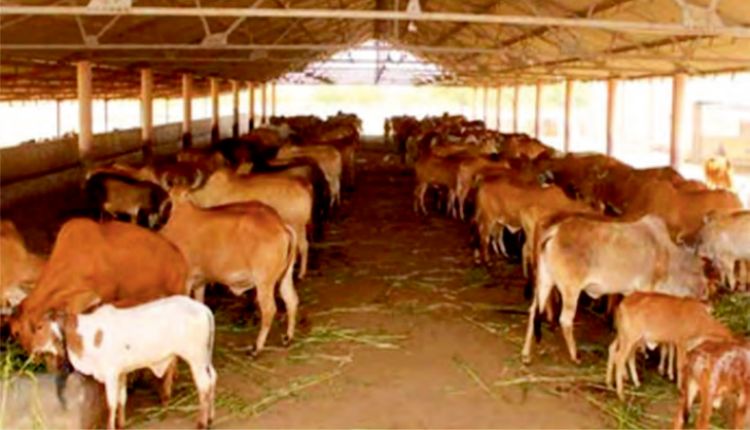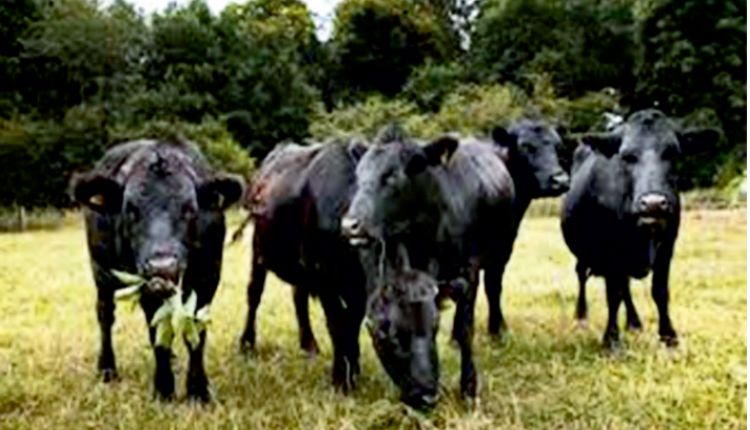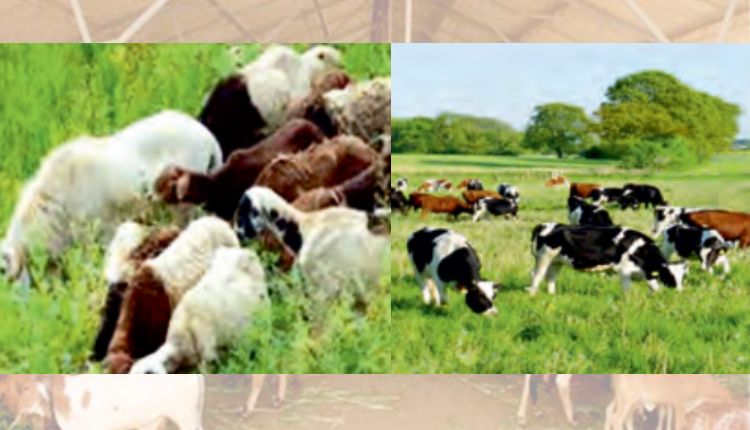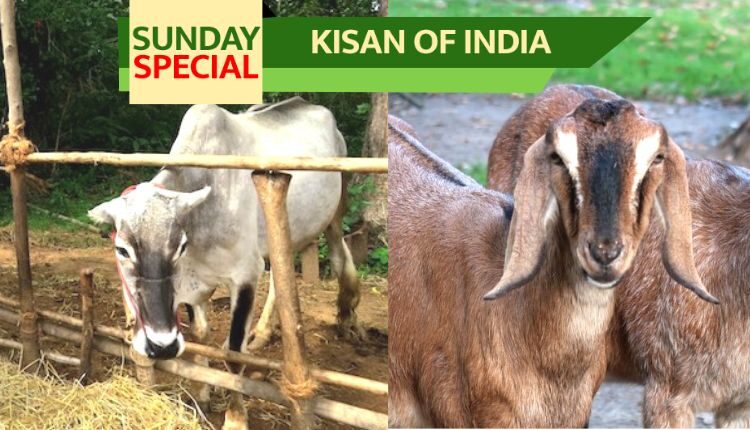Organic Animal Husbandry is a great package
Like organic food products, certification of the quality of organic livestock products is also required.
There may be relatively few progressive farmers associated with organic farming in the country, but there is no doubt that there is a golden future of farming only in organic farming. Now, if you want to get happiness like ‘icings on gold’ from organic farming, then along with this, farmers should also adopt the methods of organic animal husbandry. Due to this, both organic farming and animal husbandry are mutually beneficial because both of them complement each other.
Animal husbandry is related to those crores of people of the country who are not even regular farmers. That’s why the scope of benefits of adopting organic animal husbandry can also be very wide. Keeping these facts in mind, the Kisan of India now talks about organic animal husbandry, about which every farmer and animal husbandry must know and understand. Even though they may have many difficulties in adopting it at the moment, but we believe that if you have scientific information about the best practices of animal husbandry i.e. organic animal husbandry, then you will definitely want to adopt it at the right time and in favourable conditions.
What is organic animal husbandry?
According to the definition of organic animal husbandry, it is such a system of livestock production that is concerned with organic and biodegradable inputs or inputs, animal nutrition, animal health, animal housing and animal breeding in the ecological system. That is why, just as the inclusion of any chemical and man-made elements is prohibited in organic farming, in the same way organic farming conditions apply to every input or input used in organic animal husbandry. Like – Avoiding the use of chemicals, cultured animal feed etc.
In other words, just as low production based on limited inputs in traditional agriculture system gets special place as well as high price, in the same way the products produced from organic animal husbandry also get special status in the food market. is achieved. That’s why organic farming is as important as organic farming in terms of making farming sustainable and profitable, it is equally beneficial to link it with organic animal husbandry. However, it is necessary that it is very important to set a suitable standard or standard for organic animal husbandry.

Certification of organic animal husbandry
Certification is most important for organic products because organic agricultural or animal products are considered a symbol of purity and excellence all over the world. That’s why the material produced from livestock is also strictly monitored for organic quality and like organic food products, the quality certification of organic livestock products is also done by the same recognized agencies which are APEDA i.e. Agricultural and Processed Food Products Export Development Authority (APEDA). APEDA) has authorised. These certification agencies inspect and verify the production process of organic foods.
Indeed, organic livestock products are foods that achieve animal welfare, environmental protection, minimal drug use, and production without harmful substances. In the biological system developed for this, milk is produced by increasing the immunity of animals, keeping in mind the happiness and comfort of the animals. Similarly, there is a strong emphasis on raising meat-producing livestock with minimal waste. So that there is no adverse effect on the animals and the environment as well.
Characteristics of Organic Livestock System
Organic animal husbandry is a food production system in which animal welfare is not compromised. It does not contain the regular use of growth regulators, prophylactics, antibiotics or any feed additives for animals. Even organic livestock feed adheres to the rule of at least 80 percent being produced according to organic standards and without the use of artificial fertilizers or pesticides.

Demand for Organic Livestock Products
Like the products of organic farming, the demand for organic livestock products is increasing day by day at the global level, because the number of consumers around the world is increasing very fast who are interested in organic livestock products like milk, egg, etc. , ready to pay many times higher price for meat etc. This means that if the farmers and animal husbandry are ready to produce high quality products, then they will not face any problem in getting better returns for their hard work, skill and investment.
Obviously, if farmers adopt organic animal husbandry along with organic farming, then their income can increase manifold. For this, it is necessary to have organic label prescribed by the certification agency on all marketable products of livestock and its products should be advertised with organic label.
Basic mantras of organic animal husbandry
Correct understanding of animal behaviour: In organic livestock management, instead of treating animals, more emphasis is placed on preventing them from diseases and diseases. So that animals can be kept stress free. That is why in organic livestock management, proper understanding of animal behavior is of utmost importance to ensure the health and care of animals.
Prenatal Management of Livestock: Biological management of animals to be added to organic animal husbandry should be started from the last one third of pregnancy or hatching. New animals should be bought from such a firm, where the current status of their diseases is correct or who have a certificate that the animals are free from infectious diseases. Livestock should be bought directly from organic farms and not from open markets or animal markets. It is also very important to quarantine new animals for 4 weeks before adding them to the farm.
Animal nutrition and systematic grazing: The food material of animals i.e. fodder-water should also be under organic management. In this, pasture and fodder crops should also be produced under the rules of organic farming. However, in organic animal husbandry, animals are allowed to use non-synthetic and synthetic substances as feed additives or additional nutrients for dairy animals less than 9 months of age, provided that up to 20 percent of the inputs are for such supplementary nutrients. are also allowed to be met from non-organic sources.
Plastic pellets, urea fertilizers and by-products from mammalian or poultry slaughter are not allowed in organic farming. In this, it is mandatory to give the calves the organic milk of their mother till the age of about 3 months. The nutritional system of animals should be such that pastures play a vital role. Genetically engineered bacteria, antibiotics, other medicines, hormones and growth factors etc. should not be used in animal feed.
Housing: Organic livestock producers must maintain conditions that promote optimal animal health and accommodate the animals’ natural behavior. The housing of animals should be such that it can meet all their biological, physical and practical needs. There should also be arrangement for the animals to get fodder and water easily in the house. There should be good arrangement of air flow in animal housing so that they can be properly protected from dampness, pollution and dust. The animal housing should have enough space for all the animals.
Animal Waste Management: In organic animal husbandry, farmers should lay full emphasis on preparing organic manure from animal waste. So that the pollutant elements of soil and water can also be recycled properly in the form of nutrients. It is mandatory to use only organic manure in organic livestock management.
Animal health care: Organic livestock producers need to establish preventive health procedures to care for their animals. Generally animals should be treated with herbal and natural methods only. Vaccination of animals related to organic animal husbandry should also be done in the same circumstances, when there is a danger of infectious diseases around. That’s why it is forbidden to treat veterinary medicine with allopathy method on most of the organic farms. Antibiotics can only be used for surgery, accidents or in situations where other medicines are ineffective.
Animal Breeding: Animal breeding is done on an organic farm in such a way that local breeds are given priority. In organic animal husbandry, more importance is given to the disease resistance of animals than their productivity. The presence of diseases in the offspring of animals is also carefully underlined. That’s why priority is given to such animals whose progeny have the least number of diseases.

For organic animal husbandry, select animal breeds that have histo-compatibility, complex antigens, breeds that are resistant to some infectious diseases. Select animal breeds that have high heredity for disease resistance. If medicines are used for veterinary medicine, its record must be kept. Along with this, details like diagnosis of disease, quantity of medicine, method of giving medicine, duration of treatment and duration of stay of medicine in the body should also be kept in writing.
Challenges to the development of organic animal husbandry
Organic livestock production requires a thorough understanding of the principles and standards. But there is generally a lack of awareness and knowledge about organic production among farmers and livestock farmers. That’s why the role of trainers and consultants is very important in the expansion of organic products. It also helps a lot in coordinating with organic certification agencies.
The rules of cleanliness related to organic farming and animal husbandry are also a bit strict. That is why only a few developing countries are able to export traditional organic products. In fact, behind the strict standards of hygiene are the restrictions imposed by countries importing organic livestock products. Livestock products are also closely monitored to ensure they are organic and adhere to strict disease control regulations.
Contact us: If farmers want to share information or experiences related to farming with us, then they can do this by calling us on the phone number 9599273766 or by writing an email to [email protected] or by sending your recording. Through Kisan of India, we will convey your message to the people, because we believe that if the farmers are advanced then the country is happy.



